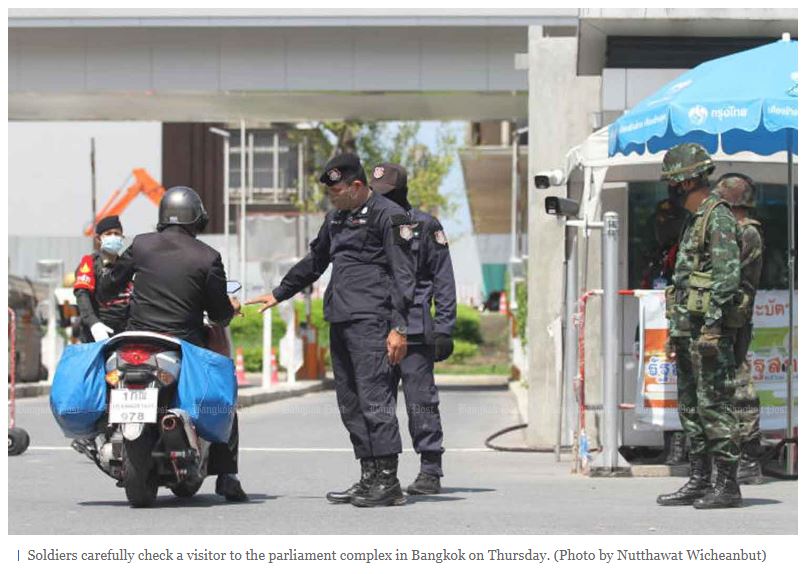Thailand: FTI urges caution in carrying out new emergency decree
The use of an emergency decree is aimed at crowd control and averting economic losses, says the newly appointed finance minister, but a business group is urging caution over how the measure is carried out.
The recently declared state of emergency is a means to handle the protests and prevent losses to businesses, said Finance Minister Arkhom Termpittayapaisith.
The move is necessary for the government and agencies in charge of national security to manage the situation and its scope covers only a specific area, Mr Arkhom said.
“The security department has to manage the situation, otherwise this will affect the business sector,” he said.
It remains opaque and difficult to assess how the Bangkok street protests will have an effect on Thailand’s economy, Mr Arkhom said.
The government banned gatherings of five or more people and the publication of news or online messages that could harm national security early on Thursday under an emergency decree to end Bangkok street protests.
The protests have escalated for three months. On Wednesday, protesters set up camp outside Government House to demand the resignation of Prime Minister Prayut Chan-o-cha.
The government said it also acted after demonstrators obstructed a royal motorcade.
Thailand’s economic contraction could be as high as 10.4% this year as trade and tourism are hit by the Covid-19 pandemic crisis, according to the World Bank.
If this holds true, it will take at least three years for GDP to recover to pre-Covid levels, said Kiatipong Ariyapruchya, senior country economist at the World Bank.
Political tensions are also lingering with the resignation of key members of the economic team and ongoing anti-government protests that may lead to greater political uncertainty and diminished investor sentiment, according to the World Bank.
The Federation of Thai Industries (FTI) said the emergency decree must be carefully enforced and state actions against protesters must be done under the rule of law.
The draconian law, which prohibits gatherings of five or more people and the publication of news or online messages in a way that can harm national security, is often an issue of contentious criticism across the public and private sectors.
“What impact it [the decree] may bring remains unknown,” said FTI chairman Supant Mongkolsuthree.
He said business people just hope the rally doesn’t escalate, which would inflict further damage on the Thai economy.
Mr Supant said he does not think the opposition’s plan to bring the emergency decree issue up for parliamentary debate will lead to more political conflicts.
“That’s a normal process,” he said. “It’s good that they talk in the House, as the debate will proceed under the rule of law.”
CONFIDENCE UNDERMINED
Flaring domestic political tensions have caused jitters among investors, with continuous sell-offs seen on the Stock Exchange of Thailand (SET).
The SET index stumbled by -0.7% and -1.7% on Oct 14 and 15, respectively. Year-to-date returns of the Thai bourse are among the worst performing of the Asia-Pacific bourses with a 23.5% decline, according to Bloomberg.
Paiboon Nalinthrangkurn, president of the Federation of Thai Capital Market Organisations, said the political protests are not the only issue putting pressure on the Thai bourse, as there are external factors undermining confidence.
These include how the hopes for a fiscal stimulus package in the US, previously expected to be approved before Nov 3, have been dimmed along with delays in development of a Covid-19 vaccine.
Investors’ concerns over the domestic political turmoil will be eased if the government can control the situation, Mr Paiboon said.
The economic sentiment and stimulus measures remain the major factors affecting capital market movement with a greater weight than Bangkok street protests, he said.
“If you ask me today, I still put weight on the economic stimulus measures more than political protests,” Mr Paiboon said. “Investors are still keeping their eyes on the new finance minister, execution of government projects, fiscal 2021 budget approval and new stimulus measures.”
Sorrabhol Virameteekul, vice-president of Kasikorn Securities, said the declaration of the state of emergency and the protest at the Ratchaprasong intersection bode ill for the prospects of the tourism and hospitality industries already reeling from the Covid-19 crisis.
“It [political turmoil] is not very surprising, but concerns are rising as no one knows how the situation will end,” Mr Sorrabhol said. “We recommend that investors take a wait-and-see approach until there is a clearer direction for both domestic and external politics.”
Additional reporting by Nuntawun Polkuamdee
Source: https://www.bangkokpost.com/business/2002887/fti-urges-caution-in-carrying-out-new-emergency-decree


 Thailand
Thailand




